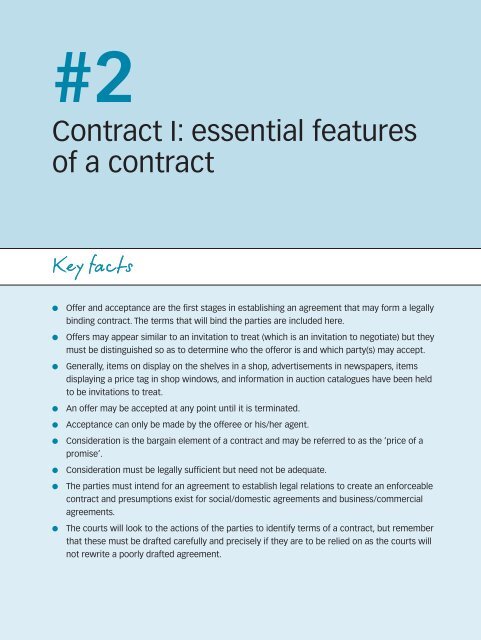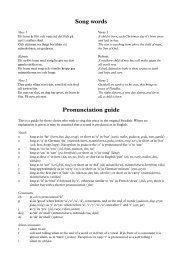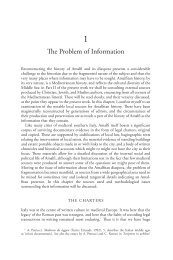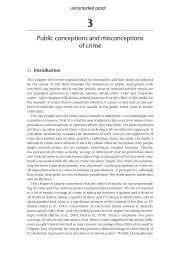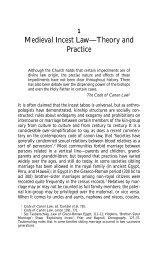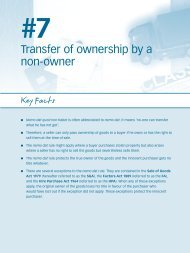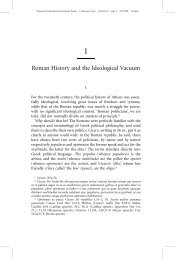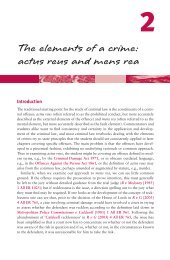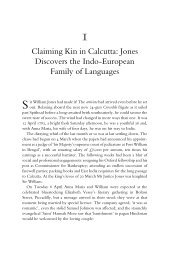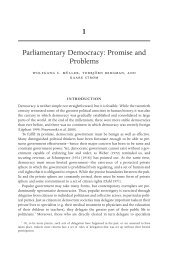Contract I: essential features of a contract
Contract I: essential features of a contract
Contract I: essential features of a contract
You also want an ePaper? Increase the reach of your titles
YUMPU automatically turns print PDFs into web optimized ePapers that Google loves.
#2<br />
<strong>Contract</strong> I: <strong>essential</strong> <strong>features</strong><br />
<strong>of</strong> a <strong>contract</strong><br />
Key facts<br />
●<br />
●<br />
●<br />
●<br />
●<br />
●<br />
●<br />
●<br />
●<br />
Offer and acceptance are the fi rst stages in establishing an agreement that may form a legally<br />
binding <strong>contract</strong>. The terms that will bind the parties are included here.<br />
Offers may appear similar to an invitation to treat (which is an invitation to negotiate) but they<br />
must be distinguished so as to determine who the <strong>of</strong>feror is and which party(s) may accept.<br />
Generally, items on display on the shelves in a shop, advertisements in newspapers, items<br />
displaying a price tag in shop windows, and information in auction catalogues have been held<br />
to be invitations to treat.<br />
An <strong>of</strong>fer may be accepted at any point until it is terminated.<br />
Acceptance can only be made by the <strong>of</strong>feree or his/her agent.<br />
Consideration is the bargain element <strong>of</strong> a <strong>contract</strong> and may be referred to as the ‘price <strong>of</strong> a<br />
promise’.<br />
Consideration must be legally suffi cient but need not be adequate.<br />
The parties must intend for an agreement to establish legal relations to create an enforceable<br />
<strong>contract</strong> and presumptions exist for social/domestic agreements and business/commercial<br />
agreements.<br />
The courts will look to the actions <strong>of</strong> the parties to identify terms <strong>of</strong> a <strong>contract</strong>, but remember<br />
that these must be drafted carefully and precisely if they are to be relied on as the courts will<br />
not rewrite a poorly drafted agreement.
Essential <strong>features</strong> <strong>of</strong> a <strong>contract</strong><br />
Essential <strong>features</strong> <strong>of</strong> a <strong>contract</strong><br />
The following <strong>features</strong> must be present in a <strong>contract</strong> to make it legally enforceable.<br />
OFFER An expression on willingness to be bound on terms. Terms established<br />
by the <strong>of</strong>feror here – and only those included at this stage form part <strong>of</strong><br />
the <strong>contract</strong>.<br />
ACCEPTANCE The party(s) to whom the <strong>of</strong>fer has been made communicates a full and<br />
unconditional acceptance <strong>of</strong> the terms <strong>of</strong> the <strong>of</strong>fer (exceptions exist in<br />
unilateral <strong>of</strong>fers and the postal rule).<br />
CONSIDERATION The bargain element <strong>of</strong> the <strong>contract</strong>, also known as ‘the price <strong>of</strong> a<br />
promise’. A simple <strong>contract</strong> may be a bad bargain, but it must be a<br />
bargain to be enforceable.<br />
INTENTION The parties must intend that the agreement is to establish a legally<br />
binding <strong>contract</strong> rather than simply a social/domestic arrangement.<br />
CERTAINTY The terms <strong>of</strong> the <strong>contract</strong> must be suffi ciently clear and precise to be<br />
enforceable.<br />
Unilateral and bilateral <strong>contract</strong>s<br />
Bilateral <strong>contract</strong>s are those where one <strong>of</strong> the parties <strong>of</strong>fers to do something in return for an<br />
action by the other party; they exchange promises. For example, one person agrees to wash<br />
the other’s car in return for having his/her lawn mowed. Acceptance <strong>of</strong> the <strong>of</strong>fer must be<br />
communicated for an agreement to be established.<br />
A unilateral <strong>contract</strong> is one where a party promises to perform some action in return for<br />
a specifi c act by another party, although that other party is not promising to take any action.<br />
Acceptance may take effect through conduct and need not be communicated. For example,<br />
in Carlill v Carbolic Smoke Ball Co [1893] the Carbolic Smoke Ball Co advertised its product<br />
and stated that it would pay customers £100 if they <strong>contract</strong>ed infl uenza after using the<br />
smoke ball as directed. Carlill was under no obligation to enter the <strong>contract</strong>, nor was she<br />
required to communicate her acceptance <strong>of</strong> the <strong>of</strong>fer. The <strong>contract</strong> was only formed when<br />
Carlill took her actions (ie by her conduct) and thereby accepted the <strong>of</strong>fer.<br />
Offer<br />
An <strong>of</strong>fer is a set <strong>of</strong> terms under which the <strong>of</strong>feror (the party making the <strong>of</strong>fer) is willing to be<br />
bound. An <strong>of</strong>fer is made to the <strong>of</strong>feree (the recipient <strong>of</strong> the <strong>of</strong>fer) and he/she must accept in<br />
the method expressed (if stipulated) by the <strong>of</strong>feror.<br />
16 Concentrate Business Law
Revision tip<br />
Invitation to treat<br />
Invitation to treat<br />
Typical questions can include differentiating between an <strong>of</strong>fer and an invitation to treat. This is a vital<br />
distinction and requires reference to key cases. Problem questions are <strong>of</strong>ten used and may follow a<br />
similar form to the facts in case law: adverts in shop windows or newspapers, items on the shelves<br />
in retail outlets, and so on.<br />
An invitation to treat is a willingness to accept <strong>of</strong>fers or enter into negotiations. In this<br />
context, the word ‘treat’ means to negotiate, and hence it can be viewed as an invitation<br />
to negotiate for a good or service. The justifi cation for invitation to treat is pragmatic, as<br />
without it, retailers would be making standing <strong>of</strong>fers to the whole world which, if they were<br />
unable to fulfi l, would result in a breach. Examples can be seen where traders sell goods in<br />
advertisements, auctions, and negotiations.<br />
Pharmaceutical Society <strong>of</strong> Great Britain v Boots Cash Chemists [1953] 2 WLR 427<br />
Boots Chemists operated a ‘self-service’ system involving the customer tendering his/her selections<br />
to a cashier, it amounted to an <strong>of</strong>fer by the customer to buy rather than an <strong>of</strong>fer by Boots to sell. As<br />
such, items displayed on shelves are generally held to be an invitation to treat and not an <strong>of</strong>fer.<br />
Exceptions do exist, and where greater details are present in adverts with regards to price,<br />
quantity, and availability etc, then an advert can amount to an <strong>of</strong>fer rather than invitation to<br />
treat (see Leftkowitz v Great Minneapolis Surplus Stores [1957] – although this is a judgment<br />
from the United States and is <strong>of</strong> persuasive authority only).<br />
✓<br />
Looking for extra marks?<br />
Include in an answer on <strong>of</strong>fer/invitation to treat the Leftkowitz case and explain the difference between<br />
displaying goods (invitation to treat) and identifying specifi c details <strong>of</strong> quantity and availability <strong>of</strong> goods<br />
(that may indicate an <strong>of</strong>fer).<br />
Items in shop windows displayed with a price tag (Fisher v Bell [1960]) are also held as invitations<br />
to treat. Such an approach is necessary to prevent a shop from displaying goods with<br />
an incorrect price tag on and then being compelled to proceed with the <strong>contract</strong> on the basis<br />
<strong>of</strong> an innocent mistake.<br />
Advertisements are a potentially problematic area because the words used can lead buyers<br />
to assume an <strong>of</strong>fer has been made. The courts will <strong>of</strong>ten interpret advertisements in<br />
newspapers, magazines, and journals as an invitation to treat. With advertisements generally,<br />
whether these are through television, radio, or the internet, the same rules apply.<br />
Chapter 2 <strong>Contract</strong> I: <strong>essential</strong> <strong>features</strong> <strong>of</strong> a <strong>contract</strong> 17
Invitation to treat<br />
Partridge v Crittenden [1968] 1 WLR 1204<br />
Partridge had placed an advert in a magazine that read ‘Quality British bramblefi nch cocks,<br />
bramblefi nch hens . . . 25s each.’ The buyer responded to the advert, sending payment, and he<br />
received a bird. Partridge was then charged with <strong>of</strong>fering for sale a bird contrary to the Protection<br />
<strong>of</strong> Birds Act 1954. Partridge’s defence was that the advertisement was not an <strong>of</strong>fer to sell but an<br />
invitation to treat and the Divisional Court followed previous rulings and agreed. Therefore no <strong>of</strong>fence<br />
had been committed.<br />
Negotiations occur between parties in the <strong>contract</strong> process. Questions <strong>of</strong> item, price, quantity,<br />
and the terms surrounding any possible <strong>contract</strong> may come under consideration by the<br />
parties. This can lead to disagreements as to when an <strong>of</strong>fer may have been made that is capable<br />
<strong>of</strong> acceptance. The courts have had to look to the parties’ statements and other evidence<br />
to ascertain their true intentions (Harvey v Facey [1893]).<br />
Mere negotiations between parties are insuffi cient to create a <strong>contract</strong> and the courts will<br />
not imply an <strong>of</strong>fer in these situations. Similarly, a request for information will not amount to an<br />
<strong>of</strong>fer capable <strong>of</strong> acceptance, or be considered a counter-<strong>of</strong>fer that would extinguish the <strong>of</strong>fer.<br />
Gibson v Manchester CC [1979] 1 WLR 294<br />
Gibson was a tenant and occupier <strong>of</strong> a Council house. He had wished to purchase the house under<br />
the ‘right to buy’ scheme. The Council wrote to Gibson informing him that it might be willing to sell<br />
the property and Gibson responded saying he wished to go ahead with the purchase. When political<br />
control <strong>of</strong> the Council changed, the policy <strong>of</strong> right to buy was revoked. Gibson claimed a breach <strong>of</strong><br />
<strong>contract</strong> as the Council refused to continue with the sale but the House <strong>of</strong> Lords held that the Council<br />
never made an <strong>of</strong>fer to sell and hence there could be no valid acceptance. All that had occurred in<br />
this case were the fi rst steps towards negotiations for a sale which never reached fruition.<br />
Revision tip<br />
When using Gibson v Manchester CC as precedent for the distinction between an <strong>of</strong>fer and an<br />
invitation to treat, it is always worthwhile to compare the decision with Storer v Manchester CC.<br />
Storer demonstrates where the negotiations have proceeded to a formal <strong>of</strong>fer being made.<br />
Storer v Manchester CC [1974] 3 All ER 824<br />
The Council sent Storer an application form to purchase his Council house which, once completed<br />
by him, it promised to sign and complete the sale. He completed the form as per the instructions<br />
but the Council failed to sign and return the application as promised. Again, a change in political<br />
control <strong>of</strong> the Council led to a reversal <strong>of</strong> the Council house sale programme including Storer’s sale,<br />
but it was held that a <strong>contract</strong> had been formed. The letter from the Council was a fi rm intention<br />
to proceed with the sale when Storer returned the application form, and the Council was bound to<br />
proceed with the sale.<br />
18 Concentrate Business Law
Termination <strong>of</strong> an <strong>of</strong>fer<br />
Invitation to treat<br />
An <strong>of</strong>fer may be terminated as a result <strong>of</strong> the actions <strong>of</strong> the <strong>of</strong>feror or by expiry due to<br />
the passage <strong>of</strong> time. It is advisable for the <strong>of</strong>feror to include terms as to when the <strong>of</strong>fer<br />
will expire. This prevents confusion and requires the courts to consider the aspect <strong>of</strong><br />
reasonableness.<br />
The following are examples <strong>of</strong> how an <strong>of</strong>fer can be terminated:<br />
• the <strong>of</strong>feror’s death: an <strong>of</strong>fer not accepted before the <strong>of</strong>feror’s death dies with him/her.<br />
If the <strong>of</strong>fer has been accepted and then the <strong>of</strong>feror dies, where practicable, the <strong>contract</strong><br />
must still be performed (by the dead person’s estate or executors: Bradbury v<br />
Morgan [1862]). This will not apply to <strong>contract</strong>s involving personal service (here the<br />
<strong>contract</strong> will be frustrated);<br />
• expiry <strong>of</strong> a fi xed time limit: if the time limit for acceptance expires, then the <strong>of</strong>fer dies<br />
and cannot be later accepted;<br />
• <strong>of</strong>fer expires after a reasonable time: a <strong>contract</strong> may include a time limit after which<br />
the <strong>of</strong>fer will expire. Where none exists, the <strong>of</strong>fer will automatically expire after a<br />
reasonable time (which is dependent on the facts <strong>of</strong> the case). See Ramsgate Victoria<br />
Hotel v Montefi ore (1865–66);<br />
• rejection: where the <strong>of</strong>feree rejects the <strong>of</strong>fer, it is destroyed (this can be explicit in<br />
words or through his/her conduct);<br />
• a counter-<strong>of</strong>fer: negotiations involve <strong>of</strong>fers and counter-<strong>of</strong>fers, but a counter-<strong>of</strong>fer acts<br />
to ‘kill the original <strong>of</strong>fer’ (Hyde v Wrench [1840]); and<br />
Hyde v Wrench [1840] 3 Beav 334<br />
An <strong>of</strong>fer <strong>of</strong> the sale <strong>of</strong> property was answered with a counter-<strong>of</strong>fer <strong>of</strong> a lower amount. This counter<strong>of</strong>fer<br />
destroyed the fi rst <strong>of</strong>fer so it could not later be accepted.<br />
• revocation:<br />
The <strong>of</strong>feror may revoke the <strong>of</strong>fer at any time before it is accepted; even<br />
where he/she has promised to keep the <strong>of</strong>fer open for a specifi c period <strong>of</strong> time (ins<strong>of</strong>ar<br />
as it is communicated by the <strong>of</strong>feror/reliable third party: Dickinson v Dodds (1875–76)).<br />
If such an element appears in an examination question, remember to identify the<br />
exception to this general rule where the <strong>of</strong>feree has provided consideration for the<br />
<strong>of</strong>fer remaining open.<br />
In situations <strong>of</strong> ‘unilateral’ <strong>contract</strong>s the option to revoke the <strong>of</strong>fer may be more diffi cult.<br />
For example, in Carlill [1893], it would be quite unrealistic to communicate the revocation to<br />
every person who may have seen the advertisement in a newspaper, but taking reasonable<br />
steps (such as another advertisement in the same newspaper revoking the <strong>of</strong>fer) may be<br />
acceptable.<br />
Chapter 2 <strong>Contract</strong> I: <strong>essential</strong> <strong>features</strong> <strong>of</strong> a <strong>contract</strong> 19
Acceptance<br />
Acceptance<br />
The acceptance <strong>of</strong> the <strong>of</strong>feror’s terms must be unconditional. In many cases this may constitute<br />
a ‘yes’ or ‘no’ reply to an <strong>of</strong>fer made. There are situations where such a simple exercise<br />
may not be possible and it requires the courts to give direction as to how acceptance may be<br />
established. An <strong>of</strong>fer may be accepted by conduct; slience, however, can never constitute<br />
acceptance.<br />
Standard form <strong>contract</strong>s<br />
These are <strong>of</strong>ten used by businesses to simplify <strong>contract</strong>s. Using standard terms and conditions<br />
removes the requirement for individual negotiation with customers (subject to compliance<br />
with the various statutory obligations). When two businesses are trading and each has its<br />
own standard form <strong>contract</strong> then problems can arise when attempting to ascertain on which<br />
set <strong>of</strong> standard terms the <strong>contract</strong> has been made. To determine which set <strong>of</strong> terms forms<br />
the <strong>contract</strong>, a court will look at which was the last set <strong>of</strong> terms to be used in the exchanges<br />
between the parties before the <strong>contract</strong> was performed. This is the ‘last shot’ principle and is<br />
illustrated in the following case:<br />
Butler Machine Tool Co Ltd v Ex-Cell-O Corporation (England) Ltd [1979] 1 WLR 401<br />
The companies <strong>contract</strong>ed for the supply <strong>of</strong> a machine but each used its own standard form<br />
<strong>contract</strong>, one with a price variation clause present, and one without. Hence, the case involved the<br />
‘battle <strong>of</strong> the forms’. It was held that as Ex-Cell-O had included an acknowledgement strip that<br />
Butler signed and ‘accepted’, the <strong>contract</strong> was based on these terms, without the price variation<br />
clause.<br />
Butler is always used where the question involves business disputes over standard form<br />
<strong>contract</strong>s; the ‘battle <strong>of</strong> the forms’. Remember, the courts are more ‘robust’ in determining<br />
agreements with businesses and the courts will use fi rst/last shot approaches to determine<br />
which <strong>contract</strong> is effective.<br />
Communication <strong>of</strong> acceptance<br />
For a valid <strong>contract</strong> to exist, the terms <strong>of</strong> the <strong>of</strong>fer must be accepted by the <strong>of</strong>feree. This<br />
means:<br />
• outward evidence <strong>of</strong> the <strong>of</strong>feree’s intention to accept an <strong>of</strong>fer has to be demonstrated<br />
(in unilateral and bilateral <strong>contract</strong>s) and communicated (in bilateral <strong>contract</strong>s) in<br />
order for effective acceptance;<br />
• silence is not effective acceptance ( Felthouse v Bindley [1862]);<br />
20 Concentrate Business Law
•<br />
Acceptance<br />
the <strong>of</strong>feree may deviate in the method <strong>of</strong> acceptance stipulated in the <strong>of</strong>fer if the<br />
alternative method is as fast or quicker than that in the <strong>of</strong>fer (Yates Building Co Ltd<br />
v R J Pulleyn & Sons Ltd [1975]); and<br />
• acceptance may be evidenced through conduct (such as in Carlill [1893]). In Alexander<br />
Brogden v Metropolitan Railway Co [1877] a <strong>contract</strong>ual document had been drafted<br />
by the principals <strong>of</strong> the companies and was used in negotiations between the parties.<br />
Whilst it had not been signed, it was suffi cient that the intentions from the parties’<br />
actions enabled an agreement to be deduced.<br />
Postal rule <strong>of</strong> acceptance<br />
The general rule established with the post (importantly, where it is a valid means <strong>of</strong> acceptance)<br />
is that acceptance is valid on posting, not the receipt <strong>of</strong> the acceptance, ins<strong>of</strong>ar as the<br />
correct address and postage were included in the sent letter (Adams v Lindsell [1818]). This<br />
applies where the letter was delayed (The Household Fire and Carriage Accident Insurance<br />
Company v Grant [1879]).<br />
The postal rule is not effective, however, in situations where the express terms <strong>of</strong> the<br />
<strong>contract</strong> state that the acceptance must be received and in writing. In Holwell Securities v<br />
Hughes [1974] Lawton LJ stated that the postal rule would not be used where to do so would<br />
‘produce manifest inconvenience and absurdity’.<br />
Revision tip<br />
Always be aware that the postal rule should be discussed but is only applicable where the post is<br />
a valid means <strong>of</strong> acceptance. If the parties have expressly provided that it will not be considered as<br />
valid acceptance, or where the parties require the acceptance to be received in writing, then the<br />
standard rule <strong>of</strong> communication <strong>of</strong> acceptance remains.<br />
Instantaneous communication<br />
Compared with the postal rule, in cases involving instantaneous forms <strong>of</strong> communication, the<br />
courts have traditionally reverted to the common rule <strong>of</strong> acceptance being effective when<br />
communicated and received.<br />
Entores v Miles Far East Corporation [1955] 3 WLR 48<br />
Entores, based in London, made an <strong>of</strong>fer by telex to agents <strong>of</strong> the defendants (based in Holland).<br />
This <strong>of</strong>fer was accepted through telex received in Entores’ <strong>of</strong>fi ces in London. On the issue <strong>of</strong> where<br />
the <strong>contract</strong> was established (due to a dispute) it was held that due to the nature <strong>of</strong> instantaneous<br />
means <strong>of</strong> communication, acceptance is effective when received, not when posted. The <strong>contract</strong><br />
was concluded in London.<br />
Chapter 2 <strong>Contract</strong> I: <strong>essential</strong> <strong>features</strong> <strong>of</strong> a <strong>contract</strong> 21
Consideration<br />
This ruling can be extended to other forms <strong>of</strong> instantaneous communication such as a telephone;<br />
the <strong>contract</strong> is made at the place where the acceptance is received (Brinkibon v Stahag<br />
Stahl und Stahlwarenhandels GmbH [1982]).<br />
Consideration<br />
Consideration is a necessary component <strong>of</strong> all <strong>contract</strong>s (unless the <strong>contract</strong> is made by<br />
deed). Consideration in <strong>contract</strong> law is merely something <strong>of</strong> value that is provided and which<br />
acts as the inducement to enter into the agreement. The defi nition most defi nitively used is<br />
from the seminal case, Currie v Misa (1874–75), but it is suffi cient at this stage to recognise<br />
consideration as the bargain element <strong>of</strong> a <strong>contract</strong> – ‘the price <strong>of</strong> a promise’ or ‘the badge <strong>of</strong><br />
enforceability’.<br />
For example, X may <strong>of</strong>fer Y his mobile phone for free, informing Y that the phone will be<br />
given at a specifi c time and place, and that X intends this to be a legally enforceable <strong>contract</strong>.<br />
Y agrees. If X does not give the phone to Y as agreed, is an enforceable <strong>contract</strong> established?<br />
No – Y has given nothing to X for the agreement to provide the phone. This is a bare promise<br />
and as such it lacks consideration and cannot amount to an enforceable <strong>contract</strong>.<br />
Consideration must be given in return for the promise made, and it must move from the<br />
promisee. The promisee may exchange promises with the promisor, or he/she may provide<br />
some act or forbearance to establish good consideration.<br />
There are two types <strong>of</strong> consideration: executed and executory.<br />
Executed<br />
Executed consideration is <strong>of</strong>ten seen in unilateral <strong>contract</strong>s and involves one party making<br />
a promise in return for an act by the other party. The <strong>of</strong>feror has no obligation to take action<br />
on the <strong>contract</strong> until the other party has fulfi lled his/her part. For example, A <strong>of</strong>fers B £100 to<br />
build a wall, payment to be made on completion. B completes the building work and is entitled<br />
to the payment from A. If B did not want the work, or did not complete it, A would not have<br />
paid the £100.<br />
Executory<br />
Executory consideration is performed after an <strong>of</strong>fer is made and is an act to be performed in<br />
the future (hence executory). It is an exchange <strong>of</strong> promises to perform an act. This form <strong>of</strong><br />
consideration is frequently seen in bilateral <strong>contract</strong>s and may lead to a valid <strong>contract</strong> being<br />
established. For example, X orders a computer with the promise to pay for it on delivery, and<br />
Y promises to deliver the computer and receive the payment. The fact that consideration<br />
has not yet occurred but will take place in the future does not prevent it being ‘good’ consideration<br />
and in the event <strong>of</strong>, for example non-delivery, this may lead to a breach <strong>of</strong> <strong>contract</strong><br />
(assuming the remainder <strong>of</strong> the <strong>essential</strong> <strong>features</strong> are present).<br />
22 Concentrate Business Law
Other factors in consideration<br />
Consideration must be suffi cient (not adequate)<br />
Consideration<br />
Consideration must have some legal, material, value but it does not need to be adequate in<br />
relation to a ‘fair’ price for the <strong>contract</strong>. Per Blackburn J in Bolton v Madden [1873], ‘the<br />
adequacy <strong>of</strong> the consideration is for the parties to consider at the time <strong>of</strong> making the agreement,<br />
not for the Court . . .’<br />
Even if an item is <strong>of</strong> little value in itself, it may represent a benefi t to one <strong>of</strong> the parties<br />
and therefore can be good consideration, eg chocolate bar wrappers in Chappell & Co Ltd v<br />
Nestle Co Ltd [1959].<br />
Consideration must not be past<br />
Where a promise is made after the completion <strong>of</strong> an act, the act itself is not suffi cient to provide<br />
consideration to enforce the promise. The promisor is not obtaining a benefi t for his/her<br />
promise – the benefi t has already been received.<br />
Re McArdle, Decd. [1951] 1 All ER 905<br />
A tenant had made improvements to a property and afterwards a promise was made by the<br />
landlords to repay the expenditure for the materials used. Such payment was not made and in an<br />
action for recovery <strong>of</strong> this sum it was held that no <strong>contract</strong> had been established. The agreement to<br />
pay was made after the work had been undertaken and there was no clear intention or expectation<br />
that payment would have been made.<br />
The decision rested on the fact that since all the repair work had been completed before<br />
the document had been agreed, the consideration was wholly past and the agreement to<br />
‘repay’ the expenditure (£488) was a nudum pactum (a promise made with no consideration<br />
to support it).<br />
✓<br />
Looking for extra marks?<br />
Compare this general rule with Lampleigh v Brathwaite [1615], where the defendant, who had killed<br />
another person, requested the claimant to obtain a pardon from the King. Lampleigh was successful<br />
and as a result, Brathwaite made a promise to pay £100 for the service, but this payment was never<br />
made. It was held that Lampleigh was able to recover the £100 because the court felt that both parties<br />
must have contemplated that payment for the service would be made.<br />
The following are necessary to claim an enforceable <strong>contract</strong> exists with past consideration:<br />
• the act that is the subject <strong>of</strong> the <strong>contract</strong> must have been requested by the promisor;<br />
• there must have been in the contemplation <strong>of</strong> both parties that payment would have<br />
been made; and<br />
• all the other elements <strong>of</strong> a valid <strong>contract</strong> must have existed.<br />
Chapter 2 <strong>Contract</strong> I: <strong>essential</strong> <strong>features</strong> <strong>of</strong> a <strong>contract</strong> 23
Consideration<br />
Existing duties<br />
Consideration must be ‘real and material’ and as such, if the promisor is merely receiving<br />
what he/she is already entitled to, then there is no consideration furnished (Collins v Godefroy<br />
[1831]). The Privy Council held in Pao On v Lau Yiu Long [1980] that an existing duty owed to<br />
a third party can be good consideration.<br />
This rule seeks to ensure that improper pressure cannot be applied to renegotiate a <strong>contract</strong><br />
on better terms for the promisee. In Stilk v Myrick [1809] the captain <strong>of</strong> a vessel on<br />
a voyage promised the existing crew an equal share <strong>of</strong> the wages <strong>of</strong> two seamen who had<br />
deserted (and who could not be replaced). The wages were not provided and in the action to<br />
recover the wages, the court held that there was no consideration provided in support <strong>of</strong> the<br />
promise. The seamen were under an existing duty to ‘exert themselves to the utmost to bring<br />
the ship in safely to her destined port’.<br />
Stilk v Myrick has to be compared with Hartley v Ponsonby [1857] where the sailors in<br />
this case were promised additional money if they completed their voyage after half <strong>of</strong> the<br />
ship’s crew had abandoned the vessel. The court held they were entitled to the extra pay as<br />
they exceeded their existing duties due to the signifi cant risk <strong>of</strong> continuing the voyage with<br />
insuffi cient crew.<br />
Note performance <strong>of</strong> an existing duty may be held as good consideration where the promisee<br />
has actually conferred on the promisor a benefi t or has assisted him/her in avoiding a<br />
detriment, and no unfair pressure or duress was used in the renegotiation.<br />
Williams v R<strong>of</strong>fey Bros. & Nicholls (<strong>Contract</strong>ors) Ltd [1991] 1 QB 1<br />
R<strong>of</strong>fey Bros, building <strong>contract</strong>ors, entered into a <strong>contract</strong> with a Housing Association to refurbish<br />
a block <strong>of</strong> fl ats. R<strong>of</strong>fey sub<strong>contract</strong>ed various carpentry jobs to Williams who could not complete<br />
the work as his agreed price was too low to enable him to operate at a pr<strong>of</strong>i t. Williams informed<br />
R<strong>of</strong>fey that he would be unable to complete the work and R<strong>of</strong>fey agreed to pay a further sum in<br />
excess <strong>of</strong> the original to Williams for the work to be completed at the agreed date (this would<br />
assist R<strong>of</strong>fey, among other reasons, in avoiding delay penalties). R<strong>of</strong>fey refused to pay the additional<br />
money promised on the basis that Williams had only performed an existing duty.<br />
The Court <strong>of</strong> Appeal held that the promise to pay the additional sum was binding. Despite<br />
R<strong>of</strong>fey’s argument to the contrary, consideration was provided as R<strong>of</strong>fey did receive a benefi<br />
t, or at the very least would avoid a detriment, through the completion <strong>of</strong> the work and the<br />
avoidance <strong>of</strong> the penalty fee and/or the diffi culty in hiring a new sub<strong>contract</strong>or.<br />
✓<br />
Looking for extra marks?<br />
Identify the importance <strong>of</strong> the decision in Williams v R<strong>of</strong>fey in which it appeared the requirement<br />
for a variation <strong>of</strong> the <strong>contract</strong> had to be supported by fresh consideration. However, note its limitation<br />
to obligations for debt and in particular compare with the cases Re Selectmove [1995] and Foakes<br />
v Beer (1884).<br />
24 Concentrate Business Law
LACKS GOOD<br />
CONSIDERATION<br />
Past consideration<br />
Part payment <strong>of</strong><br />
a debt<br />
Existing duties<br />
Figure 2.1 Good consideration<br />
Part payment as consideration<br />
Consideration<br />
As a general rule, part payment <strong>of</strong> a debt will not prevent the party owed money from later<br />
claiming the balance as there is no advantage for the party taking a lower sum than that owed<br />
(Pinnel’s Case (1602)). A debt may be extinguished by proving something else <strong>of</strong> value other<br />
than money (a good or a service) has been provided, whether this is to the value <strong>of</strong> the sum<br />
owed or not (as consideration need not be adequate).<br />
There are the following exceptions to the rule regarding part payment:<br />
• if the party has paid a lower amount, but has done so at an earlier date, then this may<br />
amount to good consideration;<br />
• if there have been goods or another benefi t provided along with the lower payment<br />
then this may also provide good consideration; and<br />
• the major exception to this rule, alongside the others noted above, is the doctrine <strong>of</strong><br />
promissory estoppel.<br />
Doctrine <strong>of</strong> promissory estoppel<br />
GOOD<br />
CONSIDERATION<br />
Consideration that is<br />
sufficient (does not have<br />
to be adequate)<br />
But if something else<br />
<strong>of</strong> value is provided; debt<br />
paid earlier than due;<br />
estoppel–these can be<br />
good consideration<br />
But where the duties<br />
are exceeded; or the<br />
promise confers a benefit<br />
or assisted the other party<br />
in avoiding a detriment<br />
this can amount to good<br />
consideration<br />
The rule <strong>of</strong> part payment not being good consideration was established through the common<br />
law, but courts also created an equitable defence which stops a party that has made a (gratuitous)<br />
promise from reneging. Essentially, it seeks to suspend rights rather than to extinguish<br />
Chapter 2 <strong>Contract</strong> I: <strong>essential</strong> <strong>features</strong> <strong>of</strong> a <strong>contract</strong> 25
Consideration<br />
them (although this is a moot point in many instances, see Tool Metal Manufacturing Co v<br />
Tungsten Ltd [1955]).<br />
Central London Property Trust v High Trees House Ltd [1956] 1 All ER 256<br />
High Trees House leased a block <strong>of</strong> fl ats from Central London Property Trust in 1937. With the<br />
outbreak <strong>of</strong> war, and the consequent bombings in London, occupancy <strong>of</strong> property was reduced. In<br />
order to reduce the adverse effects, including it being unoccupied, High Trees entered into a new<br />
agreement under which the rent would be reduced by half. In 1945, the fl ats were full and Central<br />
London Property claimed for the full rent to be paid. It was held by the High Court that when the fl ats<br />
became fully let, the full rent could be claimed. However, Denning J stated (albeit obiter dicta) that<br />
any attempt to claim the balance <strong>of</strong> rent from 1940 to 1945 would not be allowed under the doctrine<br />
<strong>of</strong> promissory estoppel as High Trees relied on the promise made not to claim the full rent.<br />
This is an unusual case and its rule was made obiter, so this limits its reliance as a precedent;<br />
however the promise was enforceable even though unsupported by consideration. This was<br />
because <strong>of</strong> the existing relationship between the parties, the parties had intended to act upon the<br />
agreement, they also actually acted upon it, and the promisor intended to create legal relations.<br />
Revision tip<br />
Promissory estoppel is a complicated area <strong>of</strong> law and cases exist that challenge the application <strong>of</strong><br />
the doctrine. In a question involving promissory estoppel, knowledge and critique <strong>of</strong> these cases<br />
will ensure the highest marks. Further, highlight the uncertainty <strong>of</strong> whether its use removes the<br />
obligations completely or whether they may be reintroduced following reasonable notice. Consider<br />
cases such as Hughes v Metropolitan Railway Co (1877) and Jorden v Money (1854) when<br />
explaining the judgment <strong>of</strong> Denning J in the High Trees case.<br />
Note the limitation <strong>of</strong> the doctrine:<br />
• it may only be used as a shield not a sword (as a defence to an action); and<br />
• as an equitable remedy, it is not available to a party who has acted inequitably.<br />
Promissory estoppel would potentially allow for the enforcement <strong>of</strong> an agreement to accept<br />
a portion <strong>of</strong> a debt in full settlement and this possibility has been acknowledged in Collier v<br />
P & MJ Wright (Holdings) Ltd [2007] (pending full trial on this point in the future).<br />
Consideration is <strong>of</strong>ten linked with the concept <strong>of</strong> privity <strong>of</strong> <strong>contract</strong>, where the <strong>contract</strong><br />
involves, or is for the benefi t <strong>of</strong>, a third party. This is because the party who benefi ts from<br />
the <strong>contract</strong> has not provided any consideration and hence has no rights or obligations under<br />
the agreement.<br />
Privity <strong>of</strong> <strong>contract</strong><br />
The doctrine establishes that only parties to a <strong>contract</strong> may sue or be sued on it, and consequently<br />
provides rights and imposes obligations on those parties alone. This is important as<br />
26 Concentrate Business Law
Consideration<br />
many situations involve <strong>contract</strong>s where a right or benefi t is to be provided for a third party<br />
(although consumer <strong>contract</strong>s may allow for a third party to enforce a <strong>contract</strong> made specifi -<br />
cally for his/her benefi t).<br />
The two elements necessary to enforce a <strong>contract</strong> are:<br />
• the claimant must be a party to it ( Dunlop Tyre Co v Selfridge [1915]); and<br />
• there must be consideration provided by the promisee ( Tweddle v Atkinson [1861]).<br />
Privity <strong>of</strong> <strong>contract</strong> could, in certain circumstances, produce unfairness and inconvenience to<br />
the parties. As a consequence the common law has created many exceptions such as agency,<br />
collateral <strong>contract</strong>s, trusts, insurance <strong>contract</strong>s, restrictive covenants, and <strong>contract</strong>s for<br />
interested groups. Statute has also provided for third party action on a <strong>contract</strong>.<br />
<strong>Contract</strong>s (Rights <strong>of</strong> Third Parties) Act 1999<br />
The legislation was not enacted to replace the common law rules but rather to add rights<br />
for the third party. It enables a third party to enforce the terms <strong>of</strong> a <strong>contract</strong> if the<br />
<strong>contract</strong> expressly provides for it, or if the <strong>contract</strong> confers on him/her some benefi t<br />
(unless the <strong>contract</strong> did not intend that the relevant term should be actionable by the<br />
third party).<br />
The Act enables the third party to enforce the <strong>contract</strong> and seek damages as he/she would<br />
have been able to if he/she had been a full party to it. However, the third party will be unable<br />
to claim these damages if the injured party has already claimed the damages.<br />
The second section <strong>of</strong> the Act continues protecting third parties by preventing the parties<br />
from varying or cancelling the <strong>contract</strong> without the third party’s permission unless this has<br />
been expressly stated in the <strong>contract</strong>. There are limitations to the Act such as preventing a<br />
<strong>contract</strong> being enforced by a third party against employees in <strong>contract</strong>s or in <strong>contract</strong>s concerning<br />
the carriage <strong>of</strong> goods.<br />
Intention to create legal relations<br />
‘Legal relations’ means that the parties view the agreement as a legally enforceable <strong>contract</strong><br />
and a breach <strong>of</strong> the <strong>contract</strong> could result in a remedy being sought. The existence <strong>of</strong><br />
‘legal relations’ can be examined in terms <strong>of</strong> the sphere in which they might originate, social/<br />
domestic or business/commercial.<br />
Social/domestic<br />
Here, the presumption is that the parties do not intend to create legal relations. In<br />
Balfour v Balfour [1919] an agreement between a husband and wife regarding payment for<br />
the wife’s maintenance was considered not to be legally binding. However, the presumption<br />
involving a married couple is not made when the married couple are separated (Merritt v<br />
Merritt [1970]).<br />
Chapter 2 <strong>Contract</strong> I: <strong>essential</strong> <strong>features</strong> <strong>of</strong> a <strong>contract</strong> 27
Consideration<br />
This presumption against the creation <strong>of</strong> legal relations applies to arrangements involving<br />
friends and social acquaintances where a prior history exists between the parties (Hadley<br />
and Others v Kemp and Another [1999]).<br />
Where such parties make an outward sign that they intend the agreement to be legally<br />
binding, this will be effective (Simpkins v Pays [1955]).<br />
Business/commercial<br />
Between commercial parties, intention to create legal relations is presumed unless the parties<br />
establish an agreement to the contrary (Rose and Frank Company v J R Crompton [1925]).<br />
Revision tip<br />
Remember the presumptions, but also look out for expressed intentions that either a business/<br />
commercial agreement is to be ‘in honour’ only and hence not legally binding, or conversely, that a<br />
social/domestic agreement intends to be legally binding.<br />
Certainty <strong>of</strong> terms<br />
The terms <strong>of</strong> the <strong>contract</strong> must be certain if they are to be considered suffi ciently precise<br />
to be enforced by a court. The courts will not rewrite a <strong>contract</strong> that has been incorrectly or<br />
negligently drafted. However, the courts use following tactics to identify the terms and the<br />
true intentions <strong>of</strong> the parties:<br />
Business / commercial<br />
agreements<br />
Intention to be legally binding<br />
unless expressly excluded<br />
28 Concentrate Business Law<br />
Intention to create legal relations<br />
Courts assess this objectively<br />
Presumptions<br />
Domestic / social agreements<br />
No intention to be legally<br />
binding unless expressly<br />
provided for<br />
Figure 2.2 Presumptions identifying the existence <strong>of</strong> intention
Key cases<br />
• particular customs in a trade that may assist in removing uncertainty in the parties’<br />
intentions (Shamrock SS Co v Storey & Co [1899]); and<br />
• the previous dealings between the parties to ascertain any terms omitted in a <strong>contract</strong><br />
(Hillas & Co Ltd v Arcos Ltd [1932]).<br />
Per Lord Wright ‘It is a necessary requirement that an agreement in order to be binding<br />
must be suffi ciently defi nite to enable the court to give it a practical meaning. Its terms must<br />
be so defi nite, or capable <strong>of</strong> being made defi nite without further agreement <strong>of</strong> the parties,<br />
that the promises and performances to be rendered by each party are reasonably certain.’<br />
Revision tip<br />
Where a meaningless term is included in the agreement, then this term, but not necessarily the<br />
entire <strong>contract</strong>, may be held unenforceable (Nicolene Ltd v Simmonds [1953]).<br />
Key cases<br />
Case Facts Principle<br />
Hyde v Wrench [1840] 3 Beav<br />
334<br />
Carlill v Carbolic Smoke Ball<br />
Co [1893] 1 QB 256<br />
Rose and Frank Company v<br />
J R Crompton [1925] AC 445<br />
Wrench <strong>of</strong>fered to sell land for<br />
£1,000 to Hyde. Hyde replied<br />
with an <strong>of</strong>fer <strong>of</strong> £950 that was<br />
rejected. Later, Hyde attempted<br />
to accept the original <strong>of</strong>fer and<br />
pay £1,000 for the land, but this<br />
was rejected.<br />
A £100 reward was <strong>of</strong>fered<br />
by the defendant to anyone<br />
who used its smoke ball and<br />
<strong>contract</strong>ed infl uenza. When<br />
the claimant brought an action<br />
for the £100, the defendant<br />
claimed, inter alia, that the<br />
<strong>of</strong>fer was a ‘mere puff’.<br />
The two companies began<br />
trading with a third company.<br />
The three companies<br />
entered into an agreement<br />
regarding sales and purchases<br />
incorporating a clause<br />
that the agreement was in<br />
honour only and not legally<br />
enforceable.<br />
Upon an action for breach <strong>of</strong><br />
<strong>contract</strong> it was held that if Hyde<br />
had unconditionally accepted<br />
Wrench’s <strong>of</strong>fer to sell at £1,000<br />
an enforceable <strong>contract</strong> would<br />
have been established. The<br />
counter-<strong>of</strong>fer <strong>of</strong> £950 had<br />
(implicitly) rejected the fi rst<br />
<strong>of</strong>fer, which made it impossible<br />
to accept it at a later date.<br />
The Court <strong>of</strong> Appeal held a<br />
valid <strong>contract</strong> was in existence<br />
and the £100 was payable. The<br />
<strong>contract</strong> had been accepted<br />
through conduct, and money<br />
deposited in the bank for<br />
the settlement <strong>of</strong> claims<br />
demonstrated their sincerity.<br />
The House <strong>of</strong> Lords held that<br />
the arrangement had not<br />
created a binding <strong>contract</strong><br />
because <strong>of</strong> the ‘in honour’<br />
clause which had removed<br />
this <strong>essential</strong> feature <strong>of</strong> a valid<br />
<strong>contract</strong>.<br />
Chapter 2 <strong>Contract</strong> I: <strong>essential</strong> <strong>features</strong> <strong>of</strong> a <strong>contract</strong> 29
Exam questions<br />
Case Facts Principle<br />
Pharmaceutical Society <strong>of</strong><br />
Great Britain v Boots Cash<br />
Chemists [1953] 2 WLR 427<br />
Exam questions<br />
Problem question<br />
Gordon works as a salesman in the Orange Computers Inc store. His <strong>contract</strong> <strong>of</strong> employment provides<br />
for an annual salary <strong>of</strong> £10,000 and commission payments (at 7%) on any computers and<br />
peripherals he sells. In the last three years the commission payments have amounted to an average<br />
<strong>of</strong> £11,000.<br />
In 2008 the world economic downturn adversely affected the store. The manager, Fred, informs Gordon<br />
that the business is in severe fi nancial trouble and that he must reduce the fi rm’s outgoings. In<br />
response, Fred asks Gordon if he will forgo his salary for 2009, 2010, and 2011, and simply accept payments<br />
<strong>of</strong> commission. Fred explained to Gordon that this was required <strong>of</strong> him (and all other staff) or<br />
the business would probably not survive and it would have to be wound up owing substantial debts<br />
to creditors. As such, Gordon accepted the variation <strong>of</strong> the <strong>contract</strong>.<br />
In 2010 the economy began to grow, and in small part due to governmental incentives for investment<br />
in information technology, the store has managed to trade its way through the diffi cult times and is<br />
making a healthy pr<strong>of</strong>i t. As such, Gordon feels that he should be able to receive his wages for 2011<br />
and not simply have to rely on his commission as agreed in 2009. He also wishes to know if he can<br />
claim for his wages from 2009 and 2010 as Orange Computers Inc has suffi cient pr<strong>of</strong>i ts to repay this<br />
money.<br />
Advise Gordon whether he can obtain his wages for 2011, and also whether he would have any claim<br />
for the wages he agreed not to accept in the years 2009 and 2010. (Restrict your answer to the <strong>contract</strong>ual<br />
issues rather than any employment obligations that may be present.)<br />
An outline answer is available online at http://www.oxfordtextbooks.co.uk/orc/concentrate/<br />
Essay question<br />
Compare and contrast the approach taken by the courts when determining the acceptance <strong>of</strong> an<br />
<strong>of</strong>fer through the post and using instantaneous forms <strong>of</strong> communication. Why were opposing rules<br />
established and what impact does this have for the parties?<br />
An outline answer is available at the end <strong>of</strong> the book.<br />
30 Concentrate Business Law<br />
An action was brought against<br />
Boots on the basis that sales<br />
took place when a customer<br />
placed items in his/her<br />
shopping basket – and these<br />
sales were contrary to statute.<br />
Items displayed on shelves<br />
are an invitation to treat. The<br />
customer makes the <strong>of</strong>fer to<br />
buy and the seller (trader) may<br />
accept or decline this <strong>of</strong>fer.


